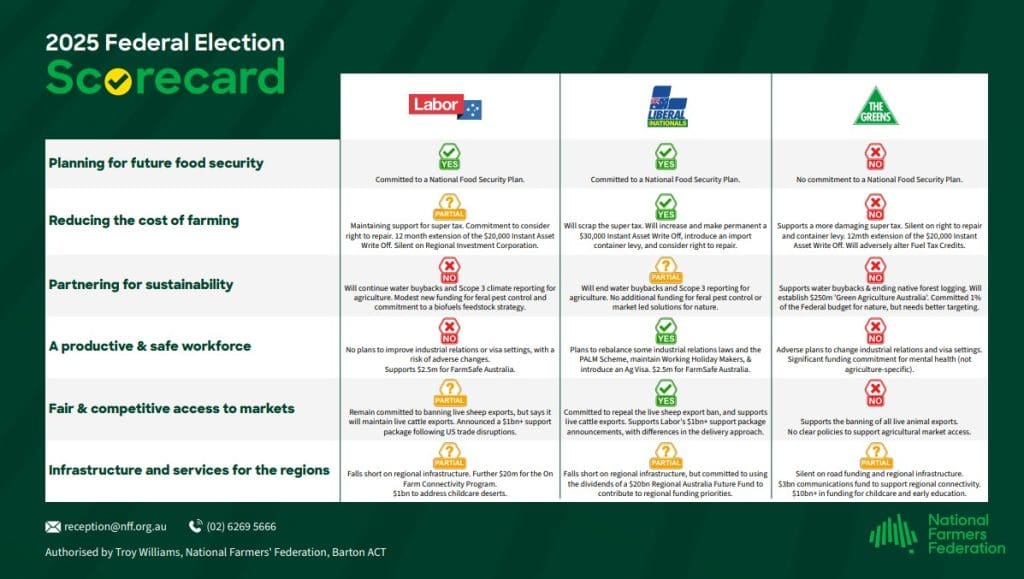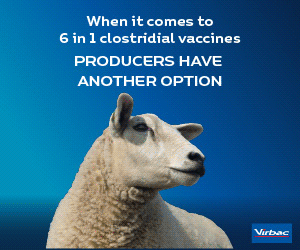
NO major political party has achieved a perfect scorecard for their agriculture and regional Australia policies in the 2025 federal election, according to the National Farmers Federation.
Australia’s national farm body today released its scorecard on the major parties’ policies in the election, but despite recognising its critical importance has not given members any voting recommendations.
The Coalition has scorecard highest overall for its food security, cost of farming, workforce and market access commitments, with crosses and question marks more common in the Labor and Greens columns.
Nevertheless NFF president David Jochinke said the NFF has tried to be fair and list all commitments, “but the Coalition has more in more areas, yes.”
But on whether this deserved a recommendation from the NFF to vote for the Coalition, Mr Jochinke said the NFF is an apolitical organisation.
“So we don’t affiliate ourselves with parties, we just try to keep them honest.
“I think the public of Australia needs to hear what agriculture’s position is and make their own mind up – I’m not here to tell people what to do, but I am here to tell people what the parties have pledged for agriculture,” he said.
Mr Jochinke said farmers and all Australians who care about where their food and fibre comes from could now “head to the ballot box on Saturday with clear eyes, thanks to the scorecard’s analysis of party policies against the NFF’s 2025 Election Platform: Securing Australia’s Farming Future.”
 “Our message to voters is simple: if you want to keep farming strong, this election matters.
“Our message to voters is simple: if you want to keep farming strong, this election matters.
“Food security, farm costs, regional infrastructure and workforce shortages aren’t issues that can sit in the too-hard basket,” he said.
“Farmers need a Parliament that’s backing them in, not backing away.”
The NFFs scorecard shows that Labor and the Coalition support a National Food Security Plan – a key ask from farmers and the broader food supply chain this election.
Labor and the Coalition have also pledged practical measures like extending the Instant Asset Write Off, funding Farmsafe Australia, and across Labor, the Coalition and The Greens, investing into childcare and varying levels of support for partnering with farmers on sustainability.
However, the NFF said some parties are either silent or actively proposing changes that would make life harder for farmers, including altering the Diesel Fuel Rebate, introducing the Super Tax, and maintaining a damaging live sheep export ban, a key policy of Labor, supported by the Greens.
Mr Jochinke said the NFF welcomed positive steps from all sides, but it was clear no party had earned a perfect scorecard.
“Farmers don’t have time for political spin.
“We’ve scrutinised the policies, and now it’s up to voters to make their call based on the facts.”
The NFF said key gaps in commitments include meaningful progress on industrial relations reform, fair visa settings for farm workers, an end to water buybacks, and proper investment in regional roads and infrastructure.
“Farmers and regional communities are looking for leadership,” Mr Jochinke said.
“The policies on the table show some good intent – but intent doesn’t put fuel in tractors, workers on farms or food on the shelves.
“We need to see serious effort to roll back the red and green tape, and tackle rising input costs and pressures driven by global and climate volatility,” he said.
“This election comes at a critical time for Australian agriculture, regional communities, and for every family who relies on farmers for affordable food and fibre.
“Post-election day, we look forward to working closely with the Government, crossbenchers and all parties to discuss how federal policies impact farmers and the cost of living for all Australians,” Mr Jochinke said.
Coalition’s nuclear policy doesn’t rate a scorecard mention
Missing from the scorecard and the accompanying release was an NFF stance on the Coalition’s nuclear-based energy policy, which Liberals Against Nuclear have said would need an annual high-security water allocation for a mammoth 200 gigalitres that would potentially have to be acquired from farmers and other water users, such as coal mines and urban water supplies, to cool the nuclear reactors.
“The nuclear idea is toxic with voters,” said Liberals Against Nuclear spokesman Andrew Gregson, a former NSW Irrigators’ Council chief executive. “It will require enormous water buybacks from farmers – which the Coalition has fought bitterly against for 15 years.”
A report, Australian nuclear energy proposals, water availability and acquisition options was commissioned by Liberals Against Nuclear and authored by former Land & Water Australia chief executive and ANU visiting fellow, Professor Andrew Campbell claims the scale of water acquisitions required to run the Coalition’s proposed nuclear reactors would need to be acquired through buybacks or compulsory acquisitions to run them at the seven proposed sites.
Coalition leaders, including Liberal head Peter Dutton, Nationals leader David Littleproud and his deputy Senator Bridget McKenzie have maintained that no water would come from the current consumptive pool for the proposed reactors.
In his recent National Press Club address, Mr Littleproud reiterated his “iron-clad” guarantee to farmers that the nuclear plan would not take any water from the consumptive pool, despite the existing water entitlement in the catchment around at least one proposed site in Victoria’s La Trobe Valley already being fully committed until 2070.
Mr Littleproud said the Coalition had made it very clear that the capacity of the proposed nuclear plants would be constrained by the existing water entitlement that exists for the coal-fired power stations on the sites. He said there are other technologies such as dry cooling.
“But we have made very clear and what we will be saying and we have said from the very outset to primary producers, there is nothing extra coming out of the consumptive pool.
“We would lose our social license for food manufacturing and processing in our country if we took that out of our consumptive pool.”
Mr Jochinke said the NFF believed that agriculture has “done its fair share in the water space.”
“We now believe it’s this government’s turn to step, especially for environmental issues, and if they choose to use water in different ways it simply cannot come from agriculture.”

HAVE YOUR SAY